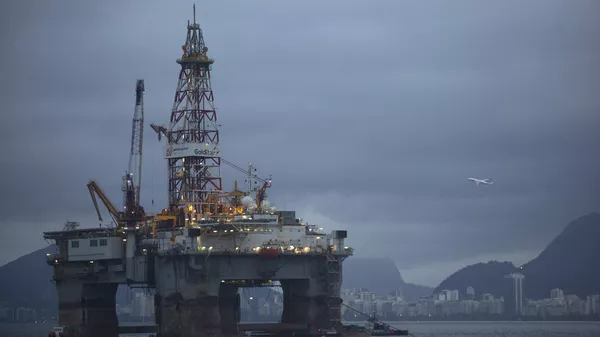Kristian Rouz — Amid Brexit-related concerns and a nascent resurgence in domestic manufacturing, the UK moves to resume shale gas production in a bid for a greater energy sustainability. British shale producer Cuadrilla has started natural gas fracking in Lancashire this week after a local judge ruled its planning is adequate and in line with environmental and safety regulations.
READ MORE: Watchdog: Trump's Plan to Allow Fracking in Nevada Threatens Wildlife
Cuadrilla said its gas extraction has commenced at the Preston New Road site in Lancashire, and could potentially expand to several other locations, despite the still lingering regulatory and judicial hurdles.
"Cuadrilla can now carry on regardless, ignoring the urgent warning issued this week by the IPCC (UN's Intergovernmental Panel on Climate Change) about the need to reduce our dependence on fossil fuels," activist group Frack Free Lancashire said.
Cuadrilla started drilling after a three-day delay caused by bad weather caused by storm Callum. The on-site activity has also faced minor disruptions from local protesters and climate change activists, who believe fracking could disrupt local ecosystems and cause hazardous pollution.
"They're not interested in what local communities have to say. After all democratic avenues have been exhausted over a seven-year campaign, there is a place for direct action to stop this industry," Henry Owen from activist group Reclaim the Power said.
For its part, Cuadrilla insists fracking is the quickest and easiest way to low-carbon energy with produced with minimal damage to the environment. The company is eyeing significant revenues, as the UK — despite being an oil-and-gas-producing nation — is also an energy importer.
READ MORE: New Energy Competiton? OPEC to Meet US Shale Oil Producers
In the wake of the UK's looming (and still uncertain) separation from the EU, Britain had better ramp up its own energy production, fracking advocates say. Or else skyrocketing fuel costs could completely erase any economic gains the UK could make from Brexit and its newly-acquired freedom to enter international trade deals.
Fracking will "displace costly imported gas with lower emissions, significant economic benefit and better security of energy supply for the UK", Cuadrilla CEO Francis Egan said.
The company has been pursuing fracking projects all across the British Isles for several years. Back in 2011, Cuadrilla began drilling on the Fylde coast, but had to halt its activities after a series of small quakes alerted nearby residents.
"I was sat in an armchair at home on a very quiet and peaceful day, and the house started wobbling," retired gas worker and local resident Terry Robinson said.
Meanwhile, UK Business Secretary Claire Perry fully embraced fracking, saying the technology would allow for a massive increase in Britain's energy production. She said natural gas is ‘absolutely part of our future', and urged a rapid expansion in fracking — once Cuadrilla testing proves successful.
"I have not seen a single bit of modelling that shows 100 percent renewables is viable," Secretary Perry said.
She stressed 80 percent of Britain's home heating and 40 percent of electricity comes from natural gas. The Secretary also suggested fracking could dramatically bring down utility costs all across Britain, while some experts warned it could also bring down production costs, putting North Sea oil and gas drillers out of business.
However, British drillers are still facing significant regulatory hurdles as preventing a rapid growth in the nascent industry. UK Onshore Oil and Gas Group, which represents Cualdrilla along with several other fracking companies, said the approvals process for a new well takes 35 to 50 weeks, a sharp increase from just 12 week prior to the original ban on fracking.
"The current planning system is very inefficient, and slow," the group's CEO Ken Cronin said. "What the industry needs is to understand the geology beneath our feet so we can start to extract shale gas for the economy."
And several Tory MPs — including Secretary Perry — have already proposed a legislation to cut the red tape to enable wat they see as a massive resurgence in the UK's energy output. The new regulatory framework would limit the ability of local councils to block drilling, and retire the outdates seismic surveys and costly drilling tests.
"The problem is that people don't like fracking," Lee Rowley, a Tory MP for North East Derbyshire said. "Let's treat the problem. I don't think we should bother with fracking".
These discussions are expected to intensify in the coming weeks, particularly so if Cuadrilla's test-drilling proves successful. Analysts from Ineos Group Ltd. recently confirmed the UK has massive reserves of natural gas, which in the medium term could not only erase Britain's reliance on supplies from the Middle East, but would allow the UK to exports energy into the rest of Europe.
A separate study from global accounting firm Ernst & Young found fracking could add at least 64,000 jobs and £33 bln to the British economy — plus many more jobs and revenues in manufacturing and other sectors enabled by cheaper energy.
For its part, Cuadrilla expects to test its operation for commercial feasibility in the first quarter on 2019.




